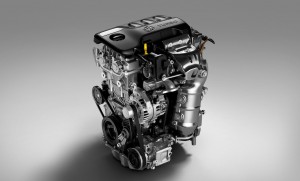
GM is rolling out its new 1.0T and 1.3T engines in China as the government is pushing for electric vehicles.
As the Chinese government puts pressure on for carmakers to build more electric vehicles, General Motors is putting its new-generation ECOTEC 1.0-T and 1.3-T dual injection engines into service in China.
The turbocharged engines were developed as part of a global architecture with the support of GM’s worldwide manufacturing and supply chain networks. They will power Buick and Chevrolet models built and sold in the domestic market starting later this year, GM officials said.
“GM is integrating our unmatched global resources with our local capabilities to offer reliable, durable and efficient propulsion systems,” said Michael Carman, GM China vice president of Global Propulsion Systems. “These new engines will offer a great ownership and driving experience to our customers across China.”
The engines are built off a new architecture and incorporate a series of cutting-edge driveline technologies. They are the first turbocharged engines to apply dual port injection, which optimizes combustion.
(GM’s Barra pushes for government help with China EV sales. For the story, Click Here.)
The engines have a compact aluminum structure and redesigned combustion chamber, further enhancing efficiency. Twelve core technologies have been adopted to significantly reduce structural noise and vibration. The innovative application of intelligent mechatronics supports precise control, green operation and high power.
The new engines are leaders in performance and efficiency, GM officials said. The 1.0 engine generates maximum power of 92 kilowatts or about 123 horsepower while the 1.3 engine produces maximum power of 120 kW or the equivalent of 160 horsepower. Fuel economy has been improved by up to 10%.
(Click Here to see more about China possibly banning internal combustion engine-powered cars.)
The new GM engines are reaching the market just as Chinese authorities are intensifying their efforts to change the nations fast-growing fleet of light-duty cars, trucks and utility vehicles to from gasoline to battery power. The use of diesel engines has been restricted for several years because of the danger of pollution.
China this week unveiled a set of emission rules but delayed a credit-score program tied to the production of electric cars, giving automakers more time to prepare for the phasing out of fossil-fuel powered vehicles in the world’s largest auto market, according to Bloomberg.
(Automakers plead with China to delay EV mandates. For the story, Click Here.)
Under the so-called cap-and-trade policy, automakers must obtain a new-energy vehicle score – which is linked to the production of various types of zero- and low-emission vehicles – of at least 10% starting in 2019, rising to 12% in 2020, the Ministry of Industry and Information Technology said on its website. The rule applies to carmakers that manufacture or import more than 30,000 traditional vehicles annually, and those who fail to comply must buy credits or face fines.
